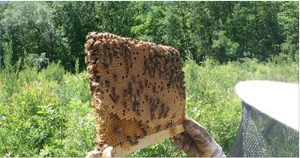Greetings and Salutations;

The world of the Bees continues to be complicated. The issue of bee deaths is a problem still, as the scientists are still trying to understand how the colonies work, and what the environment stresses do to affect them. There have been a number of arguments over the past decade or so as to what has caused the die off of colonies – the “Colony Collapse Disorder” problem. Slowly data is coming in, and, while we are still trying to interpret it, at least progress has been happening.
.
The massive die-off of colonies started in, about 2004, and has continued on since then. I recall in 2004/2006 there were beekeepers who were losing 60% to 80% of their bees. This fueled a great deal of concern in the world, as people suddenly realized that a huge percentage of the food that keeps them alive is pollinated by bees! No Bees? No Food! There after been a couple of interesting articles that have shown up in the Cyber-Ocean discussing the situation, so I thought I would post them here…
.
First off There is an interesting article in an Organics/Holistic Health website. – Now, this article is really pushing the idea that it is a big problem with NeoNic Pesticides and some herbicides that are damaging the colonies. This IS a good point, and I have to say that I agree with it to a point. There are also links to sources on this article that allow for further research.
.
A more conservative view was presented by Forbes Magazine. It appears to be fairly level-headed, in that it admits that there is a problem, but, is fairly positive about the outcome of the difficulties. Of course, being a conservative, money-oriented publication, it does blow off the issues of the effects of the NeoNics on the colony…which I think is not a wise move. However, if their data is correct, and I have not checked it yet, it appears that the big die-off of the 2004/2006 time frame has eased off, and the number of colonies seems to be fairly stabilize now. We shall see.
.
The bee population in the United States does face some serious challenges. Challenges that are putting severe pressure on them and making it harder for them to survive. One other issue (which is examined in more detail in the Forbes article) is the spread of Varroa Mites across the country. These parasites are really bad for the bees in that they spread through a colony, integrate themselves into the brood cells, and weaken all the bees in the colony. Now, one thing that is helping that situation a bit is the introduction of Russian bees into the gene pool of the American bees. The Russian bees are very resistant to the mites, and seem to help the situation quite a bit. The battle continues!
.
.
More later
Bee Man Dave
=-=-=-=-=
Powered by Blogilo